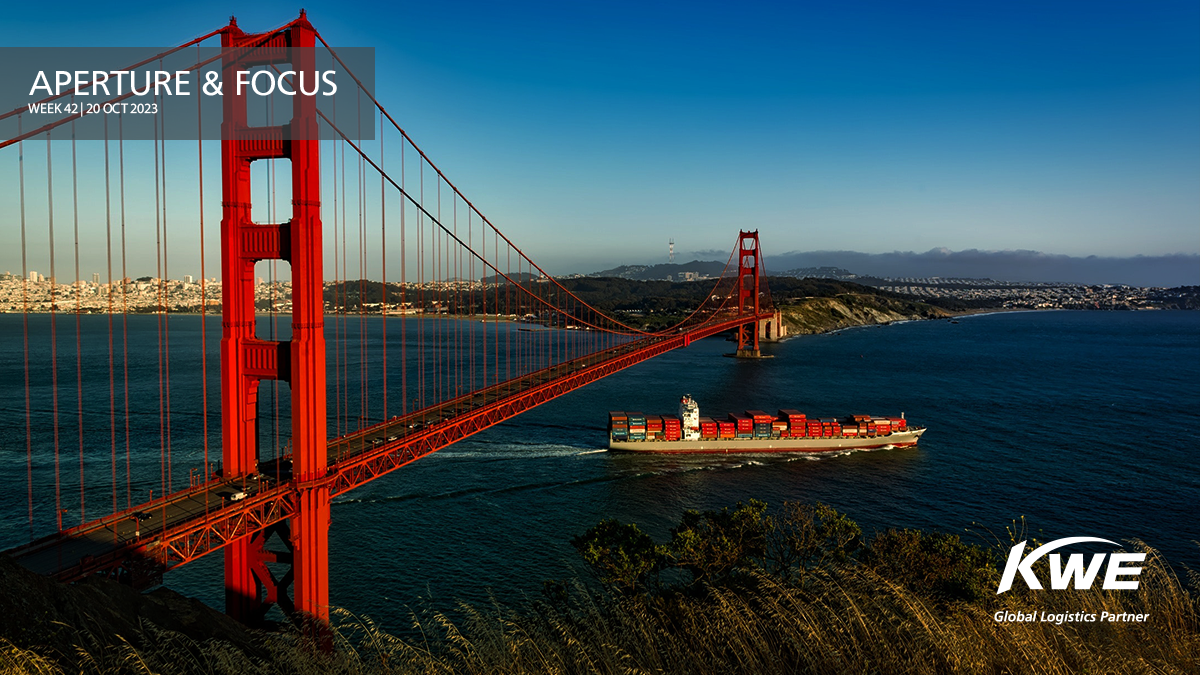Quote
Aperture & Focus 2023: Week 42

Global Aperture
The amount of idled containership capacity has risen significantly, with 315 vessels (1.18 million TEU) in lay-up, representing 4.3% of the global fleet— a notable increase from 271 ships (942,035 TEU) recorded two weeks prior. This surge in idled tonnage results from larger vessels being anchored or sent to shipyards for surveys and repairs, as carriers are increasingly mothballing surplus large ships to address oversupply and demand issues.
Several agreements were reached on October 16 regarding the "Port of Shanghai-Port of Los Angeles Green Shipping Corridor" initiative, which aims to be the world’s first trans-Pacific green shipping corridor and focuses on the application of sustainable marine fuels, shore power usage, smart terminal construction, and digital transformation of shipping. The project will involve reduced or zero lifecycle carbon emission capable ships by 2025, and it envisions the deployment of the world's first Zero Lifecycle Carbon Emission Container Ships by 2030.
Regional Focus
Americas
USA: The U.S. Environmental Protection Agency (EPA) has issued a comprehensive rule that requires entities that have manufactured or imported per- and polyfluoroalkyl substances (PFAS), known as “forever chemicals, since January 1, 2011, to report information related to PFAS uses, production volumes, disposal, and environmental or health effects in order to better understand the effects of their presence. PFAS, known as 'forever chemicals,' are used in various industries, such as construction, manufacturing, wholesale trade, retail trade, and waste management services, and covers entities that have manufactured or imported PFAS for commercial purposes since 2011.
Warehouse construction in the US, which had remained strong despite waning demand throughout other logistics sectors in 2023, has finally begun to slow, resulting in its lowest level since Q1 2014 as demand falls and interest rates discourage new investments. Although ongoing projects will still be completed, the full impact of the drop in construction will not be felt until late next year, and some of these projects were launched when the market was still strong,
Canada: Union members working on the Canadian operations of the St. Lawrence Seaway have set a strike deadline for midnight on October 22, posing a threat to the vital seaway as shippers rush to move end-of-season cargo out of the Great Lakes. This strike involves workers in both Ontario and Quebec who have been without a contract since March 31 and seek wage increases reflecting the cost of living, with the potential strike risking the shutdown of the 2023 shipping season.
Asia-Pacific
China: China's Lianyungang Port Group and Kazakhstan Railways have signed an agreement to develop a container hub in Aktau port, further boosting freight traffic along the Trans-Caspian International Transport Route, known as the Middle Corridor. This collaboration aims to enhance multimodal transport and expand the deployment of China-Europe freight trains, with the Middle Corridor connecting China, Kazakhstan, the Caspian Sea, Azerbaijan, Georgia, Turkey, and the Black Sea, before reaching Europe.
India: Among the latest of India’s recent maritime advancements is the introduction of the new Vizhinjam transshipment container port, located at the southern tip of India, which offers deep-sea capabilities and aims to attract some of the world's largest container ships that had typically bypassed Indian ports due to depth limitations, thereby increasing India's share of the global container traffic and helping it become a significant hub in the shipping industry.
Europe, Middle East & Africa
Europe: The European Commission has launched the European Ports Alliance (EPA) to address the surge in illegal drug trafficking through European ports, aiming to enhance supply chain resilience and dismantle criminal networks involved in the trade. The institution aims to foster coordination among all relevant stakeholders, including member states, local authorities, law enforcement authorities, European Union agencies, and private port operators, to combat drug smuggling and criminal infiltration of logistics hubs.
Germany: Low water levels have once again created a chokepoint on the Rhine River that is affecting shipping south of Duisburg and Cologne. Many vessels are only able to transit the Kaub waypoint at 50% capacity and shippers, including Hapag-Lloyd, have implemented surcharges to account for this disruption.
Israel: While operations continue at most terminals, a backlog continues to grow at Israeli ports due to the ongoing conflict. On October 17, Evergreen declared force majeure on its Ever Cozy vessel, diverting it to Haifa instead of Ashdod where it was unable to berth. Several shipping lines, including MSC and Maersk, are continuing to take bookings for Israel but have reported congestion at the Ashdod port due to increased security checks and labor shortages, leading to longer waiting times for vessels.